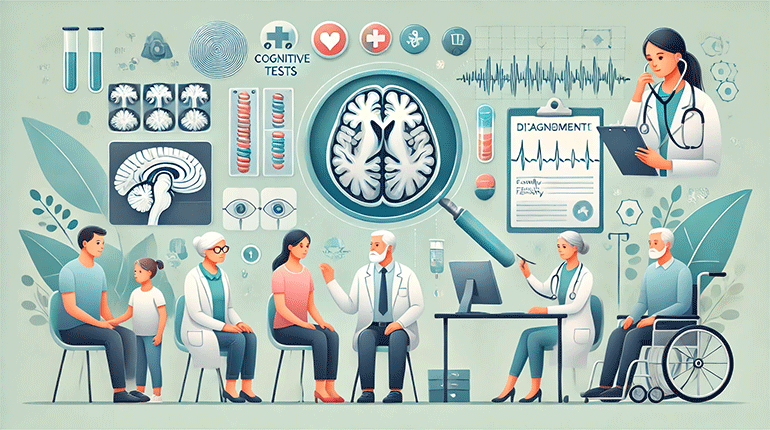Diagnosis and Assessments of Dementia
Dementia is a complex neurological condition that affects memory, thinking, behavior, and the ability to perform everyday activities. Early and accurate diagnosis is crucial for effective management, enabling patients and their families to plan and access support services. The diagnostic process involves a combination of cognitive tests, brain imaging, and thorough medical history reviews.
How Dementia is Diagnosed
The first step in diagnosing dementia typically involves cognitive tests designed to evaluate memory, problem-solving skills, attention, and language abilities. Standardized assessments like the Mini-Mental State Examination (MMSE) and the Montreal Cognitive Assessment (MoCA) are widely used to identify cognitive impairments. These tests provide insights into the severity of cognitive decline and help differentiate dementia from other conditions, such as depression or delirium, which can present with similar symptoms.
Brain scans are essential tools in the diagnostic process, offering detailed images of the brain’s structure and activity. Magnetic Resonance Imaging (MRI) and Computed Tomography (CT) scans can reveal brain shrinkage, particularly in areas such as the hippocampus, which is often affected in Alzheimer’s disease. Advanced imaging techniques like Positron Emission Tomography (PET) scans can detect abnormal protein deposits, such as amyloid plaques and tau tangles, associated with certain types of dementia.
A comprehensive review of medical history is another critical component of the diagnostic process. Healthcare professionals examine a patient’s medical background, including any history of stroke, head injuries, or chronic conditions like diabetes and hypertension that may contribute to cognitive decline. Family history is also assessed to identify potential genetic factors linked to dementia.
Role of Healthcare Professionals in the Diagnostic Process
Healthcare professionals play a pivotal role in diagnosing dementia, often working as part of a multidisciplinary team that includes neurologists, geriatricians, psychologists, and primary care physicians. Neurologists specialize in brain and nervous system disorders, providing expertise in identifying the specific type of dementia. Geriatricians focus on the health of older adults and are skilled in distinguishing dementia from other age-related conditions.
Psychologists contribute to the diagnostic process through detailed cognitive and psychological assessments, while primary care physicians often serve as the first point of contact for patients and families noticing symptoms. These professionals collaborate to ensure a thorough evaluation, ruling out reversible causes of cognitive decline, such as vitamin deficiencies, thyroid disorders, or medication side effects.
Encouraging Families to Seek Help
Early detection of dementia is vital for better outcomes, making it essential to encourage families to seek medical advice when symptoms arise. Warning signs include memory loss that disrupts daily life, difficulty planning or solving problems, confusion with time or place, and changes in mood or personality.
Educating families about the importance of early diagnosis can help reduce stigma and promote timely intervention. Support groups and public awareness campaigns play a significant role in encouraging families to recognize the symptoms and seek professional help. Open communication within families can also facilitate earlier detection, allowing healthcare professionals to intervene before the condition progresses.

